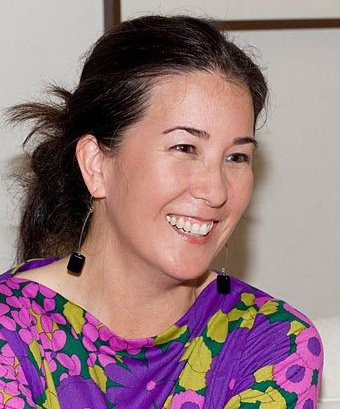In the Spotlight: Christina Cha

Working with Christina has been a profound experience for me; I feel honoured to witness what’s happened to her writing after three years of practice. She was always a good writer, but now she has mastered the art of paying attention in a scene, and it’s hypnotic. She has faith in her own sentences and solidly stays in the consciousness of her characters, so you are easily transported as you read; her words create a holographic reality. I often have the feeling of “coming to” after reading Christina’s work, like I’ve literally been somewhere else.
I also just want to say that in the excerpt she shares here, I love how she characterizes Elaine in the first paragraph.
Please do join the discussion in the comments below.

Meet Christina
About Christina Cha: I live and write my short fiction (and some fictionalized memoirs) in San Francisco. I spent many years as a blocked writer until I started working with Sarah in 2009. I have spent the last three years re-learning to write and studying the craft of fiction and am now a very, very happy writer.
Handwriting or computer?
Handwriting in an unlined, spiral-bound sketchbook with a Rolling Ball Pilot (extra fine, black).
Page count or time count?
Time count!
First drafts or revision?
I love the mystery of first drafts.
Writing solo, writing partner, or writing group?
I write solo, but I need a group or a writing partner to inspire me for revisions.
Earplugs/quiet or headphones/music?
Quiet. I use noise-cancelling headphones without the noise-cancelling function turned on. I am still looking for the perfect earmuffs.
How do you make time for your writing practice? How do you handle resistance?
I make time for writing and handle resistance by using ten-minute timed writing exercises. I choose one of Sarah's tweet prompts and set the timer on my phone. By the time I hear the alarm, I have either written at least one decent sentence or, at best, I have become lost in writing and the alarm has made me jump and I jab angrily at the snooze prompt, irritated at being interrupted. From here I can create hours to write where before I thought I was too tired, too busy, too whatever. I also learned a strategy from Peter Levitt, who teaches the Found in Translation series. His tool for resistance: Feed the hungry ghost (resistance) one grain of rice per day. One sentence to keep him at bay. My hungry ghost feels like a starving zombie, the fast-moving kind.
Sometimes, when I am descending in a spiral of unwriting writerly suckness, I will rush without thought to my notebook and start writing. This technique works in desperate times. It feels like a fake left into resistance: Yes, you are right, I am a terrible person and a terrible writer and I should sit here and numb myself with another episode of something Netflix has recommended for me. Then I dart right and run to my writing desk where my notebook is waiting for me and the resistance can't follow me because I am here and already writing and I win. The key seems to be moving without thinking. I am not exactly sure how this works.
Why do you write?
I write to say the things I can't say with my mouth, and to take my time telling stories that have more detail and take longer than a normal person would want to sit still and listen to. And I know that when I write, the real writing comes from a part of me that rarely speaks out loud in my day-to-day world, but sees and notices, feels and cares deeply – but wordlessly! Yet, it has the most to say. When I am writing, I live more solidly in this place. I see more sharply, feel more deeply, and write better. The more I live here, less filtered by my chattery everyday mind, the better (more) I write, the better (more) I live. I can't help but put a judgment here. "Better" is: more alive, awake, curious, fascinated, in love with details and feelings and spaces, both physical and less tangible. Writing from this place is deeply satisfying, and I feel relief.
Tell us about the excerpt you're sharing today.
I am in the middle of a middle draft of this story, which I started almost three years ago and set aside until last month. I am interested in exploring the relationships between the narrator, her mother, and the piano teacher, Elaine. The narrator is deeply attached to Elaine but loses her unexpectedly as a result of the quietly growing competitiveness between mom and teacher, the narrator and her friends. I am also curious to see if I can write how it feels to play the piano. This is a challenging story to write because it keeps wanting to drift from fiction to memoir. For the next draft, I am going to add some more fictional elements, change the tense and POV, and see what happens.
Excerpt from Elaine, by Christina Cha
Elaine’s eyebrows are sharp and defined, making her pretty or mean, depending. Elaine seems smaller than she really is. But she has a tiny waist, and she’s Italian. She is so uncomfortable without her makeup that when she doesn’t wear it, it is an occasion. She wears thin belts and cardigans that match her slacks, and just right jewelry that brings everything together. I think she gets her necklaces from Avon. Her husband, Buddy, is a cop.
There are two uprights in Elaine’s studio. I go there once a week for eight years, except during August. She disappears in August. When I arrive for my lesson, I sit in the foyer on the small chair with the round seat and no back. If there is another student still there, I lean against the wall and seethe quietly as I stare down at the gray and white marbled squares. Behind me is an off-limits living room. I will only be allowed in this room once.
I am fourteen. I sit on the couch and Elaine stands next to the wall of stereo in its reflective black console. We listen to a professional recording of Debussy’s Claire de Lune. Elaine is in one of her moods – she is so quiet it is like negative sound – so I know something important is happening. I sit up straight on the hard, low couch and try not to jitter my knees up and down. They twitch only occasionally. My worry that I will not understand the lesson becomes a high keening note in my mind that drowns out the sound of the music. I am so worried I will miss what she is trying to teach me that I probably already have.
With feeling, Elaine says. Move with the music. This makes me tense up and I stiffly bow toward the keyboard at random moments.
Don’t flop your hands off of the keyboard when you finish the piece. Lift them gracefully. Gracefully!
I lift my hands in what I hope is a graceful way.
Do it again.
When I am sixteen, in my last year with Elaine, I drive myself to my lessons, one of the few places I am allowed to drive by myself. I arrive with my heart pounding. I glance outside frequently to make sure my red truck is still there. It’s not mine, I share it with my brother.
My brother tells me I am like glass when I perform: it looks like I can shatter at any moment. Sitting at the piano at a recital at the University theater and adjusting the seat, taking a breath and waiting – not placing my hands on the keys until I am certain I am ready to start.
The spot light from above becomes soft and particulate. Something lifts away and becomes peripheral and I am not in my eyes and hands but I can see and play. My thoughts are a stream of unimportant commentary that has nothing to do with the music, but I have to give the stream shape and let it run, undisturbed. If I listen too closely my hands will falter. If I look too closely at the keys I will falter. I see and remember from a place that has nothing to do with words or thought.
I hear myself play, the sense of remoteness recedes, and then I am standing up to bow. Left hand on the piano, one foot behind the other, bending at the waist.
Always bow like this, Elaine tells me. You will never fall down because you are holding on, and you will never forget because you will always do it like this.
Note: These monthly spotlights showcase Mysterious Middle Drafts (MMDs). That means they are somewhere between first drafts and final drafts. This is a challenging stage! Emerging writers bravely share their work-in-progress here for discussion, but this is not a book review or critique: this is a venue for the appreciation of Mysterious Middle Drafts. Thank you for making this writing space safe and supportive.
Discussion:
-
What remains with you after reading Christina's work?
-
Can you articulate what’s working in this excerpt – and more importantly, why it’s working?
-
How is your own writing practice like Christina's? How is it different?
Please leave a comment below. And thank you, Christina!
Photo credit (top): Agustin Guiot on Unsplash.

8 comments
Leave a comment